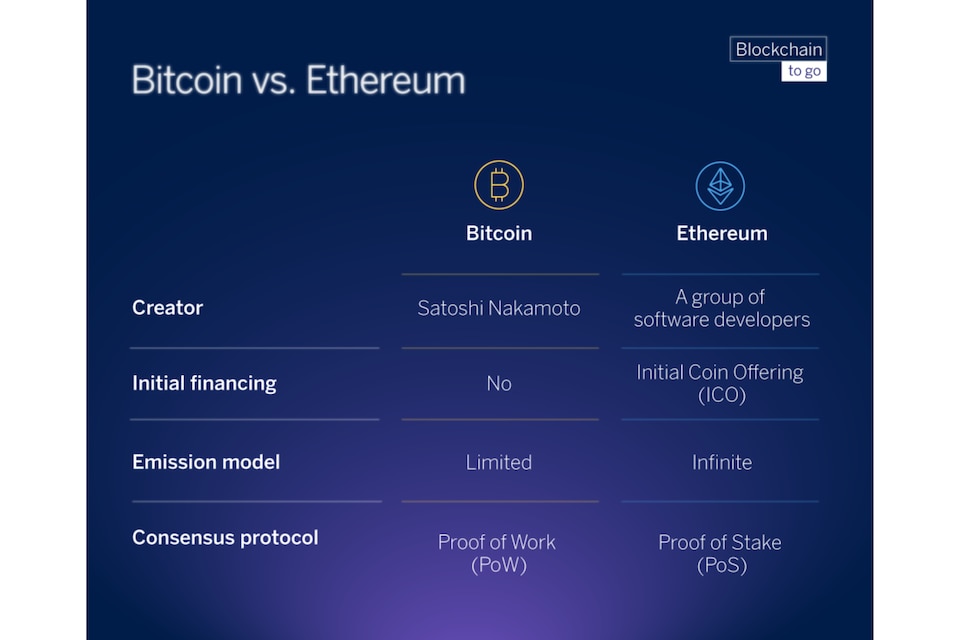These are the two most popular cryptocurrencies, and while both are based on blockchain technology, there are some differences. Ranging from their creation or value to their issue or the consensus profile they use, Bitcoin and Ethereum are battling it out to rule the crypto scene.
American football and rugby, pizza and meat pie, yoga and Pilates. As much as any two sports, dishes or fitness pursuits share many things, they also differ in many ways. It is the same story with Bitcoin (BTC) and Ethereum (ETH): both are based on blockchain technology, however, while Bitcoin was essentially developed to be a digital payment method, Ethereum is seeking to become the platform par excellence for the development and distribution of decentralized applications, and specifically those aimed at the financial sector (DeFi). Both of these most popular cryptocurrencies share certain features, but also display quite a few differences.
How did they come about?
Let's start at the beginning. Bitcoin was created by Satoshi Nakamoto, who in 2009 began the cryptocurrency revolution. Like the most famous graffiti artist, Banksy from the UK, nobody actually knows who Nakamoto is. He left Bitcoin in the community's hands some time ago.
Ethereum was created by a large team of developers, including the programmer and writer Vitalik Buterin, born in Russia, raised in Canada and currently living in Switzerland.
Initial funding
The development of Bitcoin was completely open and Satoshi Nakamoto did not request or raise funds. The original group of developers was unpaid. Today, only a few of them receive a salary courtesy of individual donations from foundations and organizations that support the crypto world.
Ethereum began development after an initial coin offering - or ICO - in 2014, which raised $18 million. Developers, designers, translators and other key actors in making the project a reality were paid from this capital.
Switzerland, a winning formula
Switzerland has the perfect recipe to stay on the podium as a financial capital - and to go further. The tradition, innovation and sophistication of its private banking attracts investment.
Decentralization level
Bitcoin is a decentralized cryptocurrency. It is the network with the most nodes, miners, developers, processing power and forks (when nodes decide to make changes to the software).
Ethereum, by contrast, is more centralized by its developers, who mark the path the blockchain must follow.
Token value
One Bitcoin has always been worth more than an Ethereum coin. In 2023, a BTC is priced at €25,651, whereas an ETH stands at €1,704. In addition to the wider spread and awareness of Bitcoin, one of the reasons behind this difference lies in the issuance model.
Issuance model
Bitcoin has a limited number of coins: 21 million to be exact. At present, 90% of the total has already been issued.
Ethereum has an infinite and inflationary issue system, although it has control measures such as token burns, which keep this inflation from exceeding 2% a year.
Consensus
The consensus protocol is another major difference between Bitcoin and Ethereum. Bitcoin adopts the Proof of Work (PoW) model, a mining method that is only possible with ASIC (hugely powerful computing equipment based on integrated circuits or chips and developed to perform very specific functions). Miners receive a reward when they manage to be the first ones to solve the calculation that validates a new block.
Since September 2022, after The Merge update, Ethereum has used the Proof of Stake (PoS) model, which has lowered energy use by up to 99%, since complex mathematical calculations are no longer required to validate transactions. Anyone seeking to be selected to add blocks to a PoS blockchain must stake a certain amount of their cryptocurrencies (staking). The chances of being selected are random, although people who put a large number of cryptocoins at stake are more likely to be chosen.


